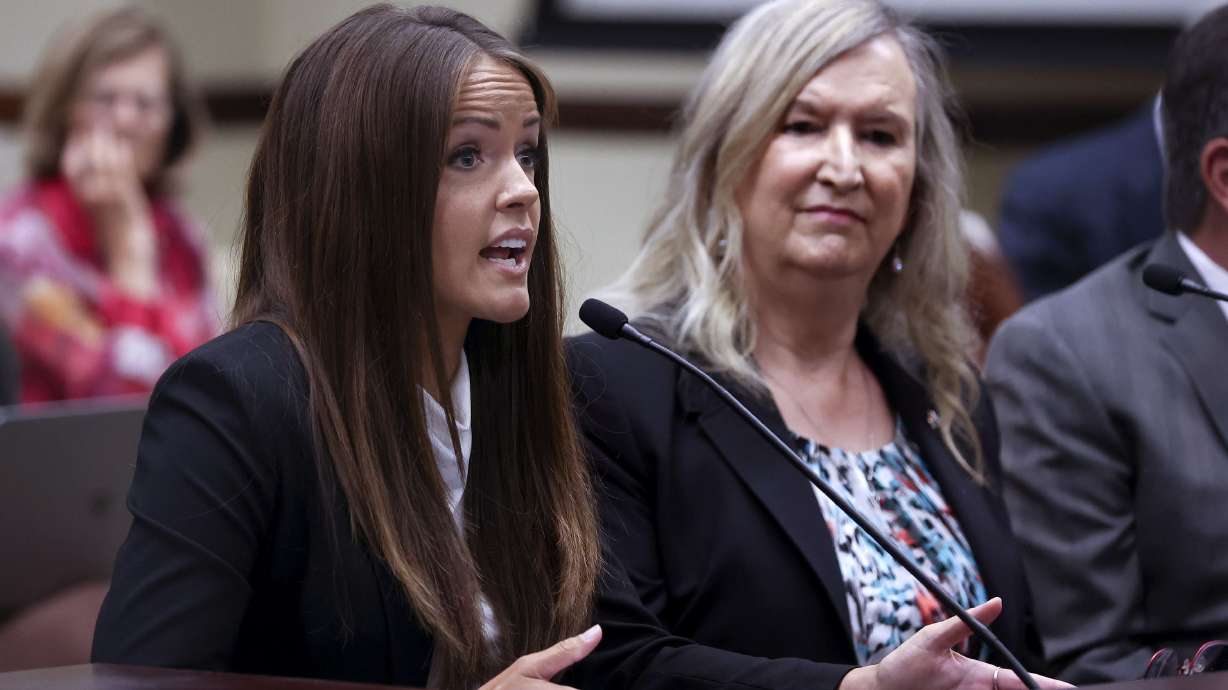Estimated read time: 5-6 minutes
This archived news story is available only for your personal, non-commercial use. Information in the story may be outdated or superseded by additional information. Reading or replaying the story in its archived form does not constitute a republication of the story.
SALT LAKE CITY — The Utah House passed two of the session's more contentious bills on Wednesday — one that would start a commission to determine whether transgender students can play on school sports teams, and another that would create a new medical license to allow anesthesiologist assistants to work in the state.
HB11 would require students to upload their birth certificate and select the sport they want to play. For transgender students, a commission would decide whether to give them permission.
The legislative-appointed commission would include a doctor, sports physiologist, university-level athletic trainer, coach and other experts, according to the bill.
Transgender student-athletes
Sponsor Rep. Kera Birkeland, R-Morgan, noted in the House that she's heard from colleagues that the bill either goes too far or does not go far enough in preserving fairness in sports.
Although some have said they want her to bring back the legislation she sponsored last year that sought to ban transgender girls from participating on girls' sports teams, Birkeland said states that have passed such a law are not enforcing it due to litigation.
That version of the bill failed last year in a Senate committee.
After working over the last year on the issue with parents and other advocates, Birkeland saw few solutions as there isn't enough data yet about transgender youth in sports. The commission would work on the data aspect, the lawmaker said.
Rep. Clare Collard, D-Magna, asked how many students the bill might affect.
Four transgender student-athletes have gone through the existing school activities association policy — which allows students to play if they have changed their birth certificate and are taking hormone treatment — to play on teams, Birkeland said.
She said she knows another "handful" of athletes who did not go through the policy but have told her they are transgender.
Rep. Ray Ward, R-Bountiful, said he believes the bill acknowledges two important issues "and tries to bring a balance to them" — the need for athletes born female who have "put in a lot of effort," and for transgender athletes to "feel welcome."
But Rep. Gay Lynn Bennion, D-Cottonwood Heights, contended the "range and variety" of sizes within those born the same gender is already "great." Because she wants to show support for the transgender people in her life, she said she would not support this bill.
When asked whether a child would need to "submit to an examination by a doctor" to see if they fit guidelines, Birkeland said they would not.
All athletes who want to play already need to upload their birth certificate into a system. If there is a mismatch between the gender on a birth certificate and the team they want to play on, the system would catch it and it would trigger the process, Birkeland said.
There would not be a "medical check" required, she said, but they would meet with a commission and discuss things like how tall they are compared to the "baseline" for that age — whether they have a material competitive advantage.
The bill passed the House 52-16 along party lines, with Republicans supporting it. It will move to the Senate for a vote before receiving final passage.
Anesthesiologist assistant license
SB121 co-sponsor Rep. Mike Schultz, R-Hooper, said data shows anesthesiologist assistants are safe as 17 states already allow them to be licensed.
"And 17 of the states make up 50% of our nation's population," Schultz said.
He said the data is based on 50 years "and millions and millions of medical procedures."
Rep. Jen Dailey-Provost, D-Salt Lake City, addressed criticism from those who oppose the bill and fear anesthesiologist assistants would compete with nurse anesthetists.
Speaking in support of the bill, she argued it would not affect nurse anesthetists' ability to practice.
"As a legislative body, we must do everything we can to support development of patient-centered care teams. And this model of the anesthesiologist and (anesthesiologist assistants), where appropriate and where it's safe, is a great answer to that call," Dailey-Provost said.
Rep. Norm Thurston, R-Provo, described the debate as "one simple issue."
"There are people out there who are trained and qualified to do a job, and we're standing in the way of letting them do it. This bill corrects a problem," he said.
But some questioned why the state needs to create a new license.
Rep. Merrill Nelson, R-Grantsville, emphasized that nurse anesthetists "are also trained and qualified, and perfectly capable of doing this work."
"And so what this bill is designed to do is to fill space that could be filled by trained, licensed and prepared CRNAs who are already here," Nelson said.
He contended the competition is between nurse anesthetists and anesthesiologists, who are using anesthesiologist assistants as a "battering ram" against nurse anesthetists.
Rep. Suzanne Harrison, D-Sandy, a physician by trade, said she supervises nurse anesthetists. Anesthesiologist assistants are like physician assistants, she said.
"The reality is, as Utah grows, we are being asked to provide safe care in more places than any of us can be," she said. "This is not about pushing anybody out of a job. This is about as we grow, we need more skilled folks to be able to offer the care."
She described the bill as "keeping our loved ones safe" when they receive medical care.
The bill passed the House 58-13, moving it to the Senate for a vote.










